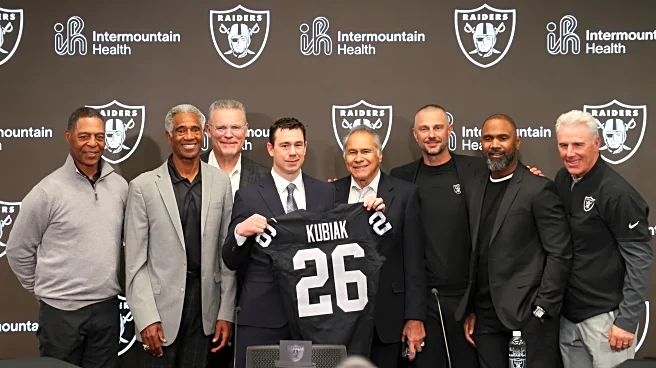What's Happening?
The Austin Film Festival recently featured 'Nuremberg,' a film directed by James Vanderbilt that revisits the historic Nuremberg Trials of 1945. The film focuses on the public trials of Nazi leaders, emphasizing
the importance of justice being both done and seen. The narrative centers on American military psychologist Douglas Kelley, played by Rami Malek, who studies high-ranking Nazis, including Hermann Göring, portrayed by Russell Crowe. The film explores the psychological dynamics between Kelley and Göring, as well as the broader legal and moral challenges faced by U.S. Supreme Court Justice Robert H. Jackson, played by Michael Shannon, in establishing the international tribunal.
Why It's Important?
The film 'Nuremberg' serves as a reminder of the significance of the Nuremberg Trials in establishing a precedent for international justice and accountability. By dramatizing these events, the film highlights the complexities of prosecuting war crimes and the moral imperatives involved. It underscores the necessity of transparent legal processes in dealing with crimes against humanity, which remains relevant in contemporary discussions about international law and human rights. The film also provides a cultural reflection on how historical narratives are constructed and remembered, potentially influencing public understanding of justice and accountability.
What's Next?
The film is set to open in theaters on November 7, potentially sparking renewed interest and discussion about the historical and legal implications of the Nuremberg Trials. It may also lead to further exploration of similar historical events in cinema, encouraging filmmakers to tackle complex legal and moral issues. The release could prompt educational institutions to incorporate the film into curricula focused on history, law, and ethics, fostering a deeper understanding of the trials' impact.
Beyond the Headlines
Beyond its historical narrative, 'Nuremberg' raises questions about the portrayal of justice in media and the ethical responsibilities of filmmakers in representing real events. The film's focus on the psychological interplay between Kelley and Göring invites viewers to consider the human dimensions of justice and the challenges of confronting evil. It also reflects on the role of storytelling in shaping collective memory and the potential for film to influence public perceptions of historical events.











